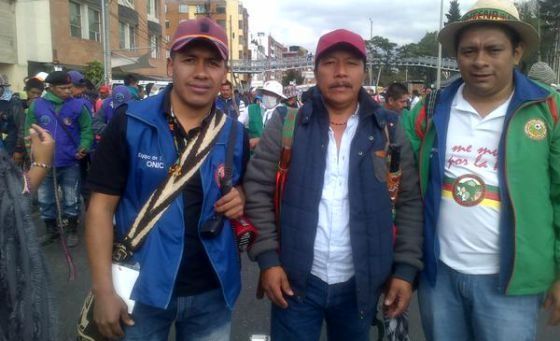Indigenous communities from Cauca, one of the regions most affected by Colombia’s internal armed conflict, announced mobilizations on Wednesday to demand the release of Feliciano Valencia, an Indigenous leader who received the National Peace Award in 2000.
Valencia was arrested Wednesday for allegedly kidnapping an army soldier in 2008. He faces up to 18 years in prison.
An undercover soldier dressed as a civilian allegedly infiltrated an Indigenous protest that year in order to collect intelligence on the movement. The soldier was seized and later sentenced to 20 lashings, claimed Indigenous activists.
In 2010, Valencia was arrested, judged and released over the same charges he faces today, as his defense explained the responsibilitiy was collective, and that Indigenous communities applied their justice against the soldier who was at the time on Indigenous territory, according to a constitutional right they had been granted in the past.

Valencia (center). | Photo: Twitter
However, Colombia’s Public Ministry recently appealed the sentence, and on Tuesday a Cauca court annulled the 2010 sentence.
On Wednesday, the Regional Indigenous Council of Cauca (CRIC), which includes over 90 percent of the region's Indigenous communities, declared it will permanent mobilize until Valencia's release. They argued Indigenous justice should remain autonomous from the state’s criminal justice system. According to the Colombian Constitutional Court's ruling, Indigenous justice can indeed apply under various circumstances, for instance on Indigenous territory and on Indigenous individuals.
Valencia's lawyer Soraya Gutiérrez Arguello claimed that “in this case, there is existing evidence that Indigenous justice could apply,” adding that she denounced in recent weeks irregularities against the native peoples' autonomy, reported El Pais.
“They want to delegitimize [a right] that is inscribed in the Constitution and that should prevail over ordinary legal norms,” she stated.
The CRIC declared in a statement that if a sentence was to be applied in this case, then it should apply to the whole community.
They also criticized the government for attempting to criminalize the Indigenous movement.
A few months earlier, the Cauca Indigenous movement, led by Valencia among others, staged protests, occupying at least seven city halls, as well as land lots they claimed belonged to their ancestors. Valencia then condemned in the media the social and environmental prejudices of sugar cane multinationals operating in the region.
Ariel Avila, analyst of the Colombian internal armed conflict from the Peace and Reconciliation Foundation, warned that the government's move could have significant consequences, as Valencia “was converted into a peace champion in the region, where the situation is so touchy,” he told El Pais. Valencia had also gained recognition when he demanded that former President Alvaro Uribe comply with his promises of social policies in the region.
“This detention can be taken as a persecution against him, for his complaints and activism,” he added.
Left-wing lawmakers, including Piedad Cordoba and Ivan Cepeda, and human rights activists also spoke out against Valencia's arrest.
Detención de @felicianovalen es claramente una persecución al movimiento indígena, no descansaremos hasta liberarlo. #FelicianoLibre
— Piedad Córdoba Ruiz (@piedadcordoba)
septiembre 16, 2015
“The detention of Valencia is clearly a persecution of the Indigenous movement, we will not rest until his release.”
Captura de Feliciano viola jurisdicción indígena y acentúa persecución a mov social #FelicianoLibreYa @C_Pueblos pic.twitter.com/KLzPVrWiQI
— Alberto Castilla (@CastillaSenador)
septiembre 17, 2015
“The arrest of Feliciano violates the Indigenous juridiction and and increases the persecution of the social movement.”